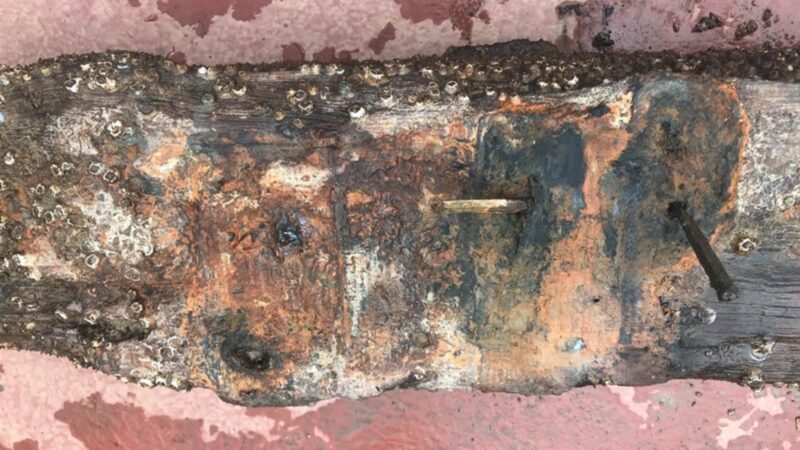The last known intact US slave ship is too ‘broken’ and should stay underwater, a report recommends
By Safiyah Riddle, Associated Press
MOBILE, Ala. (AP) — The last known U.S. slave ship is too “broken” and decayed to be extracted from the murky waters of the Alabama Gulf Coast without being dismembered, a task force of archaeologists, engineers and historians announced following a yearslong investigation.
The task force headed by the Alabama Historical Commission said Thursday that the Clotilda, the last ship known to transport enslaved Africans to the United States, had been broken in half by a large vessel and severely eroded by bacteria. The 500-page report says that the “responsible” way to memorialize the ship is to protect it under the water where it was discovered six years ago.
“There is no other site in the world that presents such physical evidence as the Clotilda,” said James Delgado, a lead marine archeologist on the investigation who said the priority was preserving that physical evidence. “The Clotilda is the scene of the crime, so everything we did was in that crime scene investigation manner.”
The wooden schooner at the heart of the investigation was commissioned in 1860 by Timothy Meaher, one year before the Confederacy was created and decades after the importation of slaves was made punishable by death in 1808. Captained by William Foster, the ship traveled to West Africa and illegally smuggled 110 Africans back to Alabama. Foster then attempted to burn and sink the ship to hide the crime.
After the Civil War freed the survivors of the Clotilda, historical records show 32 of them bought land from Meaher and established what is now Africatown, formally known as Plateau, about 3 miles (4.8 kilometers) north of Mobile.
The ship’s remains stayed, unidentified in the brackish Mobile River until 2019. On Thursday, the task force presented photos of some charred remains of the hull that were extracted throughout the investigation — evidence that supported the story documented by historians and community members for decades.
Before the state-funded $1 million investigation, it was unclear how well the ship had weathered the over 160 years under water. Some had hoped it was intact enough to be fully excavated and turned into a museum on land.
“Museums have power, and that ship loses its power if it is sitting in the water,” said Ben Raines, a local reporter and historian who wrote a book about the Clotilda.
Raines said that he is still optimistic that the ship could be excavated and turned into a museum because the task force said that option is still scientifically and technically possible. Raines said that a museum would be a significant resource to all descendants of the enslaved in the U.S. and could bring much needed revenue to the Africatown community. Many residents in attendance at Thursday’s meeting expressed a similar sentiment.
Delgado didn’t rule out that option, but said that process would require the ship to be disassembled “piece by piece, nail by nail,” and could compromise some of the remaining physical clues about the experiences of the enslaved people aboard.
That key historical evidence includes the lower hull where the enslaved Africans were held in captivity. Deep water dives revealed the confined chambers where 110 people were held remain mostly intact.
The president of the Clotilda Descendants Association, Jeremy Ellis, became visibly emotional when Delgado shared details of the compartment where his ancestors were kept.
“Since we’ve been able to learn more about what they really experienced and how small that cargo hold was and how on top of each other they were, it’s very chilling,” said Ellis, who is in his early 40s and a sixth-generation descendant of Clotilda survivors Pollee and Rose Allen. “And it makes me want to continue the effort of reconciliation and healing for the descendants.”
Instead of an excavation, the report recommended a plan that would preserve the structure underneath the water by installing large pillars around the ship to protect it from other ships and vessels. The ship is submerged in a designated Wildlife Management Area and the town is listed on the National Register of Historic Places, which means the process will require the U.S. Army Corps of Engineers to get federal permitting to install the protections. Representatives from the Army Corps of Engineers who have been integral to the investigation said the process could be resolved in a matter of months as long as there aren’t serious conflicts between the environmental protections and the needs of the ship.
The ship’s discovery in 2019 reignited a longstanding debate over how to address the harrowing legacy of the Clotilda, especially for the direct descendants of the survivors. The Meaher family still has millions of dollarsin real estate holdings in the area, as well as parks and roads that bear the family name.
Zora Neale Hurston’s bestselling book “Barracoon” documents the life of Cudjo Lewis, the Clotilda’s last surviving enslaved African. Released in 2018, “Barracoon” includes stories about Lewis’ upbringing in Africa, experiences aboard the slave ship and during his enslavement, and his part in finding Africatown. Lewis died in 1935 at the age of 94.
As a result, Africatown and the Clotilda are frequently cited in the national conversation about reparations.
Ultimately the task force said that the underwater preservation plan would only protect the structure for an estimated 100 years before it fully succumbs to erosion. They added the timeline could be shortened by climate change, which will likely affect the levels, temperatures and salinity of the water around the ship.
But many descendants said they are OK with letting the ship stay underwater.
Veda Robbins, 55, is also a sixth-generation descendant of Pollee and Rose Allen. Robbins grew up in nearby Mobile but clearly remembers going to her great aunt’s house in Africatown in her childhood. Robbins married in the local Africatown church and later baptized her children there.
Robbins said that the ship doesn’t matter as much as the need to revitalize the Africatown community, which has been ravaged by environmental contamination and disinvestment since its inception.
“I don’t want to see a ship taking up space in the community that could be used for housing and things for the community itself,” Robbins said. The population of the unincorporated town has dwindled significantly to just under 2,000 people.
Robbins echoed the official position of the Clotilda Descendants Association: Ultimately, the ship is less important than the stories of the people who survived it, along with the descendants who are already struggling to keep the Africatown community intact.
—-
Safiyah Riddle is a corps member for The Associated Press/Report for America Statehouse News Initiative. Report for America is a nonprofit national service program that places journalists in local newsrooms to report on undercovered issues.
Mitski comes undone
She may be indie rock's queen of precisely rendered emotion, but on Mitski's latest album, Nothing's About to Happen to Me, warped perspectives, questionable motives and possible hauntings abound.
This quiet epic is the top-grossing Japanese live action film of all time
The Oscar-nominated Kokuho tells a compelling story about friendship, the weight of history and the torturous road to becoming a star in Japan's Kabuki theater.
The Live Nation trial could reshape the music industry. Here’s what you need to know
On Tuesday opening statements will begin for the federal antitrust trial against Live Nation, one of the largest entertainment companies in the world.
A new one-a-day-pill holds promise for HIV’s ‘forgotten population’
It's designed to take the place of complicated, multiple drug regimens that many people with HIV need to follow. And it's also beneficial because the HIV virus is always evolving.
For filmmaker Chloé Zhao, creative life was never linear
Director Chloé Zhao used meditation, somatic exercises and dance to inspire the cast and crew of this Oscar-nominated story about William Shakespeare's family.
10 new books in March offer mental vacations
March is always a big one for books – this year is no different. We call out a handful of upcoming titles for readers to put on their radars — offering a good alternative to doomscrolling.








